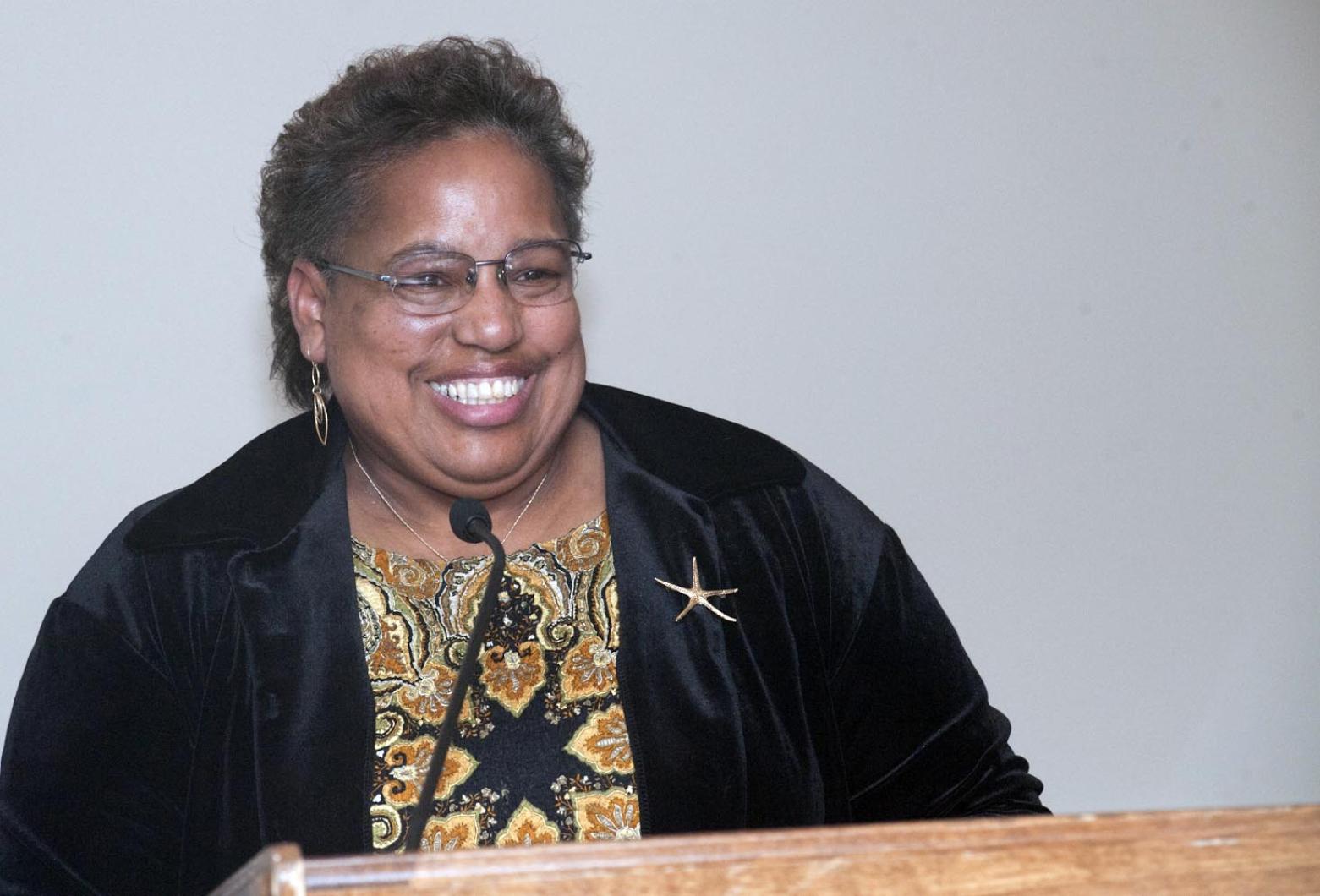Community service was the theme at the annual Martin Luther King Jr. dinner at the Harbor View Hotel on Monday night. More than 100 people attended the four-hour event which included speeches and an awards ceremony, concluding with the swearing in of officers of the local branch of the NAACP, both new and renewed. “Martin Luther King Jr.’s legacy lives in the hearts and minds of all of us who believe the world can be a better place. Let us not make the mistake of thinking that only great heroes can make a difference. On the contrary, each one of us must refuse to be discouraged, refuse to look away from injustice and renew our commitment to bring about a world where love and mercy will reign,” said Laurie Perry-Henry, president of the local chapter of the NAACP, in remarks.
Mrs. Perry-Henry called on those in attendance to get involved in the community. “Each January, we remember Dr. King on his own holiday and one of the best ways to preserve his legacy is to engage in service ourselves,” she said.
The featured speaker of the 26th annual dinner was Patricia Sullivan, who last year authored a book on the centennial of the NAACP titled Lift Every Voice, The NAACP and the Making of the Civil Rights Movement. She was introduced by Sheldon Hackney of Vineyard Haven.
Ms. Sullivan is a history professor at the University of South Carolina, a W.E.B. DuBois scholar at Harvard University and a summer resident of the Vineyard. In her speech, titled Martin Luther King’s America, Ms. Sullivan spoke of the painful years leading up to the civil rights movement and Dr. King’s pivotal role. She recalled the struggle, the lynchings and the creation of the NAACP. She drew particular attention to W.E.B. DuBois, who among other things launched The Crisis, a journal which covered lives of African Americans beginning in the early 1900s and continuing through the 20th century.
“The magazine profiled black experiences and patterns of discrimination as African Americans migrated from the countryside to city . . . It documented conditions in the South and a rising tide of segregation in the North,” she said, adding:
“During his 25 years with the NAACP, he [Mr. DuBois] relentlessly challenged America’s racial ideology and practices and helped create the machinery capable of orchestrating a sustained movement for racial equality and civil rights.”
She praised the efforts of Harvard-educated lawyer Charles Houston during the 1930s, who in his role as dean of Howard University helped to train a generation of black lawyers at a time when blacks were barred from voting in the South.
Ms. Sullivan credited him for “crystallizing a force of citizenship.”
By the time Martin Luther King Jr. arrived on the scene, the groundwork had been laid to focus the nation’s attention on civil rights. And the NAACP, she said, played an equally central role well in the civil rights movement.
Borrowing the words of Martin Luther King Jr., who in 1968 paid tribute to Du Bois on the 100th anniversary of his birth, Ms. Sullivan said: “He confronted the establishment . . . his voice was never silenced. History taught him that it was not enough to be angry. The supreme task was to organize and unite people and make their anger a transforming force.”
She said Dr. King could have been describing his own struggle.
“Martin Luther King would be 82 if alive today. Many of us wonder what he would say today. I recently asked Robert Carter, 93, one of the NAACP lawyers, how he viewed the election of Obama in light of his lifelong struggle for racial equality,” Ms. Sullivan said.
“He acknowledged it was a historic achievement, made possible by the efforts and success of the civil rights movement. But he added: ‘I didn’t do what I did to elect a black man president . . . I did it so that all children would have the opportunity for an education that allowed them to develop their potential and function in our society.’ ”
The hourlong talk drew a long applause.
The rest of the evening, no less important, was devoted to acknowledging the contributions made on the Vineyard. An awards ceremony was held for three Island members of the NAACP: W. Leo Frame Jr., Donald Mayhew and E. Jacqueline Hunt. Mr. Frame was unable to attend the event due to a prior commitment. Two regional high school students, Randall Jette and Delmont Araujo, were there to represent him.
Basil Jones, who gave the awards, said Mr. Frame, a distinguished teacher, was deserving for many reasons, including his work with students in the high school and his formation of an African American youth leadership group. Donald Mayhew was praised for his years of service in a “low-key” and spirited fashion.
Colleen Morris, chairman of the NAACP dinner, took a moment to praise the efforts of the third recipient, Ms. Hunt, who had served the local chapter as president for many years.
Ms. Hunt took the podium and urged those at the dinner to get involved in the organization and support its leadership. “We have to remember those members who have gone on before us,” she said.
She then turned to an expanding mission. “Today we need to look at our institutions. It is no longer just an issue of color. There are injustices being committed in our institutions. We need to look at injustice,” she said.




Comments
Comment policy »